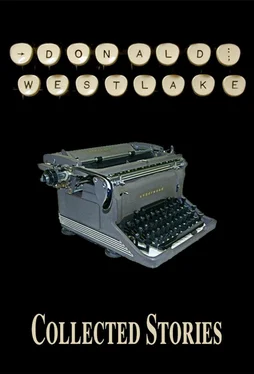Дональд Уэстлейк - Collected Stories
Здесь есть возможность читать онлайн «Дональд Уэстлейк - Collected Stories» весь текст электронной книги совершенно бесплатно (целиком полную версию без сокращений). В некоторых случаях можно слушать аудио, скачать через торрент в формате fb2 и присутствует краткое содержание. Год выпуска: 2020, Издательство: Jerry eBooks, Жанр: Фантастика и фэнтези, Детектив, short_story, на английском языке. Описание произведения, (предисловие) а так же отзывы посетителей доступны на портале библиотеки ЛибКат.
- Название:Collected Stories
- Автор:
- Издательство:Jerry eBooks
- Жанр:
- Год:2020
- ISBN:нет данных
- Рейтинг книги:5 / 5. Голосов: 1
-
Избранное:Добавить в избранное
- Отзывы:
-
Ваша оценка:
- 100
- 1
- 2
- 3
- 4
- 5
Collected Stories: краткое содержание, описание и аннотация
Предлагаем к чтению аннотацию, описание, краткое содержание или предисловие (зависит от того, что написал сам автор книги «Collected Stories»). Если вы не нашли необходимую информацию о книге — напишите в комментариях, мы постараемся отыскать её.
Collected Stories — читать онлайн бесплатно полную книгу (весь текст) целиком
Ниже представлен текст книги, разбитый по страницам. Система сохранения места последней прочитанной страницы, позволяет с удобством читать онлайн бесплатно книгу «Collected Stories», без необходимости каждый раз заново искать на чём Вы остановились. Поставьте закладку, и сможете в любой момент перейти на страницу, на которой закончили чтение.
Интервал:
Закладка:
And yet, it is impossible to merely lie in bed awake, eyes staring at the ceiling, through all the long rolling nights between Dover and New York, and even reading begins, at last, to pall. On so many voyages, I have been reduced to aimless pacing of the deck, watching the million moons reflected in the waves surrounding me.
I was delighted, therefore, on the last and latest crossing, to discover, the third night out, a fellow-sufferer, an insomniac like myself, named Cowley. Cowley was an American, a businessman, younger than me, perhaps forty five or fifty. A direct and sensible man I found him, and enjoyed his company, late at night, when all the other passengers slept and we were alone in an empty and silent sea. I found no fault in him at all, save for an occasional example of rather grim and tasteless humor, a reference to the decaying bodies in Davy Jones’s locker, or some such thing.
The nights were spent in conversation, in strolls about the decks, or in billiards, a game which we both loved but neither had ever mastered. Being of equal incompetence in the sport, we contentedly wiled away many hours in the large billiard room located on the same deck as my cabin.
The eighth night of the voyage was spent in this room, where we puffed happily at cigars, played with our normal lack of skill, and waited patiently for dawn. It was a brisk and chilly night, with a cold wet wind scampering across the waves like a chilled and lonely ghost searching for land, and we had closed every door and window in the room, preferring an atmosphere polluted by cigar smoke to being chilled to the bone.
It was only fifteen minutes after thus sealing ourselves into the room that the catastrophe struck. I don’t know what it could have been, an explosion in the huge and mysterious engines somewhere in the bowels of the ship, perhaps unexpected contact with a mine still unreclaimed from the Second World War. Whatever it was, the silence of the night was suddenly torn apart by a tremendous and powerful sound , a roar, a crash that dulled the senses and paralyzed the body, and the whole ship, the Aragon , shuddered and trembled with a violent jerking spasm. Cowley and I were both thrown to the floor, and on all the tables, the billiard balls clacked and rolled, as though their hysteria and fear were equal to our own.
And then the ship seemed to poise, to stop and hold itself immobile while time flashed by, and I struggled to my feet, hearing the hum of absolute silence, of a broken world suddenly without time or movement.
I turned toward the main door, leading out to the deck, and saw there, staring in, a wild and terrified face, a woman, still in her nightgown, whose mouth was open and who was screaming. I started toward her, staring at her through the glass in the door, and time began again. The ship lurched, bent, and as I struggled to keep my balance, I saw her torn away, out to the emptiness, and eager waves dashed against the window panes.
It was like an elevator gone mad, hurtling down from the uppermost story. The water boiled and fumed outside the window, and I clung to the wall, sick and terrified, knowing that we were sinking, and in a matter of seconds I would surely be dead.
A final jolt, and all movement stopped. The ship lay at a slight angle, the floor was at a slant, and we were at the bottom of the sea.
A part of my mind screamed in horror and fear, but another part of me was calm, as though outside myself, separate, a brain not dependent upon this frail and doomed body. It — this part of my mind that I had never known before — it thought, it conjectured, it reasoned. The ship was lying on the sea floor, that much was obvious. But how far down, how far from the surface? Not too far, surely, or the pressure of the water would have burst the glass of the windows. Was the surface close enough for me to dare to leave the ship, this room, this pocket of trapped air? Could I hope to fight my way to the surface before my lungs burst, before my need for air drove open my mouth and let the water in to kill me?
I couldn’t take the chance. We had fallen for so long, and I was not a young man. I couldn’t take the chance.
A groan reminded me of Crowley. I turned and saw him lying on the floor against one wall, apparently rolled there when the ship sank. He moved now, feebly, and touched his hand to his head.
I hurried to him and helped him to his feet. At first, he had no idea what had happened. He had heard the explosion, had stumbled, his head had hit the edge of a billiard table, that was all he knew. I told him of our situation, and he stared at me, unbelieving.
“Underwater?” His face was pale with shock, pale and stiff as dry clay. He turned and hurried to the nearest window. Outside, the feeble light from our prison faintly illuminated the swirling waters around us. Cowley faced me again. “The lights—” he said.
I shrugged. “Perhaps there are other rooms still sealed off,” I said, and as I finished speaking, the lights flickered and grew dim.
I had expected Cowley to panic, as I had done, but he smiled instead, sardonically, and said, “What a way to die.”
“We may not die,” I told him. “If there were survivors—”
“Survivors? What if there were? We aren’t among them.”
“They’ll be rescued,” I said, suddenly full of hope. They’ll know where the ship went down. And divers will come.”
“Divers? Why?”
“They always do. At once. To salvage what they can, to determine the cause of sinking. They’ll send divers. We may yet be saved.”
“If there were survivors,” said Cowley. “And, if not?”
I sat down, heavily. “Then we are dead men.”
“You suggest we wait, is that it?”
I looked at him, surprised. “What else can we do?”
“We can get it over with. We can open the door.”
I stared at him. He seemed calm, the faint smile was still on his lips. “Can you give up so easily?”
The smile broadened. “I suppose not,” he said, and once more the lights flickered. We looked up, staring at the dimming bulbs. Yet a third time they flickered, and all at once they went out. We were in the dark, in pitch blackness, alone beneath the sea.
In the blackness, Cowley said, “I suppose you’re right. There’s nothing to lose but our sanity. We’ll wait.”
I didn’t answer him. I was lost in my own thoughts, of my wife, of my children and their families, of my friends on both continents, of land and air and life. We were both silent. Unable to see one another, unable to see anything at all, it seemed impossible to converse.
How long we sat there I don’t know, but suddenly I realized that it was not quite so dark any more. Vaguely, I could make out shapes within the room, I could see the form of Cowley sitting in another chair.
He stirred. “It must be daylight,” he said. “A sunny day. On the surface.”
“How long,” I asked him, “how long do you suppose the air will last?”
“I don’t know. It’s a large room, there’s only two of us. Long enough for us to starve to death, I suppose.”
“Starve?” I realized, all at once, just how hungry I was. This was a danger I hadn’t thought about. Keeping the water out, yes. The amount of air we had, yes. But it hadn’t occurred to me, until just now, that we were completely without food.
Cowley got to his feet and paced about the dim room, stretching and roaming restlessly. “Assuming survivors,” he said, as though our earlier conversation were still going on, as though there had been no intervening silence, “assuming survivors, and assuming divers, how long do you suppose it will take? Perhaps the survivors will be rescued to day. When will the divers come? Tomorrow? Next week? Two months from now?”
“I don’t know.”
Читать дальшеИнтервал:
Закладка:
Похожие книги на «Collected Stories»
Представляем Вашему вниманию похожие книги на «Collected Stories» списком для выбора. Мы отобрали схожую по названию и смыслу литературу в надежде предоставить читателям больше вариантов отыскать новые, интересные, ещё непрочитанные произведения.
Обсуждение, отзывы о книге «Collected Stories» и просто собственные мнения читателей. Оставьте ваши комментарии, напишите, что Вы думаете о произведении, его смысле или главных героях. Укажите что конкретно понравилось, а что нет, и почему Вы так считаете.








